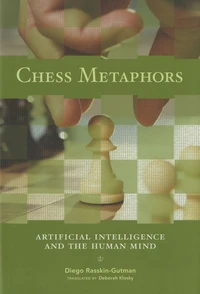Chess Metaphors. Artificial Intelligence and the Human Mind
Par :Formats :
Disponible dans votre compte client Decitre ou Furet du Nord dès validation de votre commande. Le format ePub protégé est :
- Compatible avec une lecture sur My Vivlio (smartphone, tablette, ordinateur)
- Compatible avec une lecture sur liseuses Vivlio
- Pour les liseuses autres que Vivlio, vous devez utiliser le logiciel Adobe Digital Edition. Non compatible avec la lecture sur les liseuses Kindle, Remarkable et Sony
- Non compatible avec un achat hors France métropolitaine
 , qui est-ce ?
, qui est-ce ?Notre partenaire de plateforme de lecture numérique où vous retrouverez l'ensemble de vos ebooks gratuitement
Pour en savoir plus sur nos ebooks, consultez notre aide en ligne ici
- Nombre de pages232
- FormatePub
- ISBN978-0-262-25842-5
- EAN9780262258425
- Date de parution10/02/2012
- Protection num.Adobe DRM
- Taille2 Mo
- Infos supplémentairesepub
- ÉditeurThe MIT Press
Résumé
How the moves of thirty-two chess pieces over sixty-four squares can help us understand the workings of the mind. When we play the ancient and noble game of chess, we grapple with ideas about honesty, deceitfulness, bravery, fear, aggression, beauty, and creativity, which echo (or allow us to depart from) the attitudes we take in our daily lives. Chess is an activity in which we deploy almost all our available cognitive resources; therefore, it makes an ideal laboratory for investigation into the workings of the mind.
Indeed, research into artificial intelligence (AI) has used chess as a model for intelligent behavior since the 1950s. In Chess Metaphors, Diego Rasskin-Gutman explores fundamental questions about memory, thought, emotion, consciousness, and other cognitive processes through the game of chess, using the moves of thirty-two pieces over sixty-four squares to map the structural and functional organization of the brain.
Rasskin-Gutman focuses on the cognitive task of problem solving, exploring it from the perspectives of both biology and AI. Examining AI researchers' efforts to program a computer that could beat a flesh-and-blood grandmaster (and win a world chess championship), he finds that the results fall short when compared to the truly creative nature of the human mind.
Indeed, research into artificial intelligence (AI) has used chess as a model for intelligent behavior since the 1950s. In Chess Metaphors, Diego Rasskin-Gutman explores fundamental questions about memory, thought, emotion, consciousness, and other cognitive processes through the game of chess, using the moves of thirty-two pieces over sixty-four squares to map the structural and functional organization of the brain.
Rasskin-Gutman focuses on the cognitive task of problem solving, exploring it from the perspectives of both biology and AI. Examining AI researchers' efforts to program a computer that could beat a flesh-and-blood grandmaster (and win a world chess championship), he finds that the results fall short when compared to the truly creative nature of the human mind.
How the moves of thirty-two chess pieces over sixty-four squares can help us understand the workings of the mind. When we play the ancient and noble game of chess, we grapple with ideas about honesty, deceitfulness, bravery, fear, aggression, beauty, and creativity, which echo (or allow us to depart from) the attitudes we take in our daily lives. Chess is an activity in which we deploy almost all our available cognitive resources; therefore, it makes an ideal laboratory for investigation into the workings of the mind.
Indeed, research into artificial intelligence (AI) has used chess as a model for intelligent behavior since the 1950s. In Chess Metaphors, Diego Rasskin-Gutman explores fundamental questions about memory, thought, emotion, consciousness, and other cognitive processes through the game of chess, using the moves of thirty-two pieces over sixty-four squares to map the structural and functional organization of the brain.
Rasskin-Gutman focuses on the cognitive task of problem solving, exploring it from the perspectives of both biology and AI. Examining AI researchers' efforts to program a computer that could beat a flesh-and-blood grandmaster (and win a world chess championship), he finds that the results fall short when compared to the truly creative nature of the human mind.
Indeed, research into artificial intelligence (AI) has used chess as a model for intelligent behavior since the 1950s. In Chess Metaphors, Diego Rasskin-Gutman explores fundamental questions about memory, thought, emotion, consciousness, and other cognitive processes through the game of chess, using the moves of thirty-two pieces over sixty-four squares to map the structural and functional organization of the brain.
Rasskin-Gutman focuses on the cognitive task of problem solving, exploring it from the perspectives of both biology and AI. Examining AI researchers' efforts to program a computer that could beat a flesh-and-blood grandmaster (and win a world chess championship), he finds that the results fall short when compared to the truly creative nature of the human mind.




